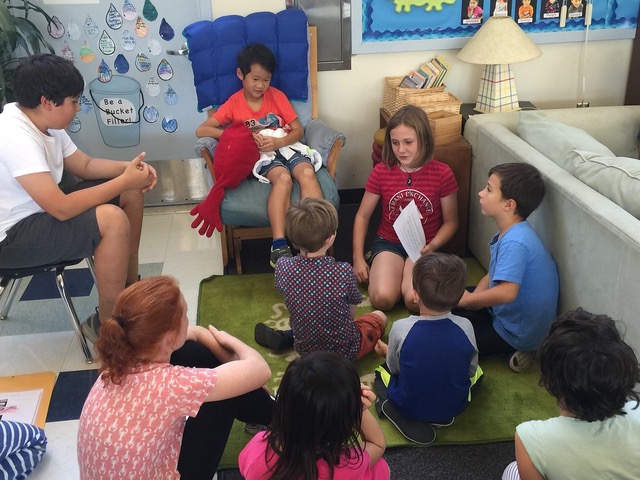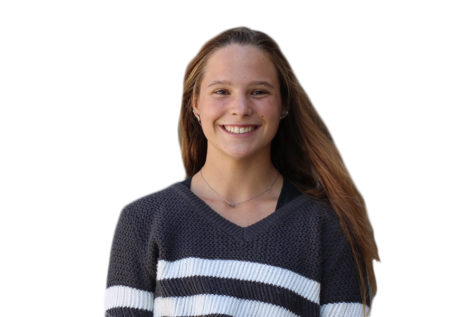In most elementary and middle schools, academic skills are the biggest focus for teachers and children. Multiplication problems, flash cards, and learning cursive are some of the quintessential aspects of traditional grade-school education.
However, high on a hill behind the Tierra Linda Middle School campus, one school defies that stereotype.
The San Carlos Charter Learning Center, or SCCLC, is the oldest charter school in California. Throughout its nearly 25 years of operation, it has put an unconventional spin on its kindergarten-through-eighth grade curriculum: in addition to academics, it focuses on something called “social-emotional learning.”
This concept, which involves navigating feelings and relationships, may seem abstract, but at SCCLC, it’s viewed as vital to a student’s future success.
“Measures of success really need to include your social emotional development because in the end, your social emotional intelligence is the predictor of [success],” said school director Stacy Emory.
According to Emory, one of the main aspects of social-emotional learning is knowing what you are feeling.
“One of the main things [SCCLC focuses on] is knowing your emotions, like ‘What am I feeling?’ [and] giving vocab words to that,” Emory said. “And then, how do you navigate your emotions?”
Interpersonal relationships also play a large role in social-emotional learning, with methods of conflict resolution being taught and practiced often.
The curriculum is taught from kindergarten all the way through eighth grade, and relies on conflict resolution, emotion recognition, and interpersonal relationships. Students are encouraged to talk about their feelings with their peers, and solve conflicts by discussing emotions and solutions. Small class sizes make for close, deeply developed relationships between students, and regular grade-wide discussions called “circles” are integrated into the older grades. In fifth grade, a week-long field trip is taken to the MOSAIC Project, in which they are taught the “core values” of mutual respect, open-mindedness, self-respect, attitude, individuality, and community.
“A lot of [how we teach] is done very organically now,” Emory said. “Kids make mistakes, and as you’re growing and learning and maturing, you make bad choices. So [we look] at what happens naturally in the classroom, or on the playground, or just the social interactions that kids have, using those as a springpoint because it’s really relevant. Any time you can connect your curriculum to the real world, it’s going to be more meaningful to the person learning about it.”
Among SCCLC alumni, views on social-emotional learning (or SEL, as many former students call it) differ widely.
“Everyone is going to have a different social experience, but it was not too difficult for me to make friends in high school,” said Aidan Truel, a junior “Obviously, I do not see all of my friends [from Charter] every day, especially if they go to other schools, but a lot of friendships made at Charter last a long time.”
Maya Rohrer, a former SCCLC student currently studying in Switzerland, said, “[SCCLC] does a ton of group work/teamwork, which is obviously essential for most jobs.”
”
On the other hand, some former students had a less positive experience with SEL.
Samuel Bloom, a sophomore at DTech, felt pressured by this educational program to open up to other people.
Since class sizes at SCCLC are very small — the graduating class of 2017 was 35 people in total — friendships can be put under a lot of strain over the nine years students spend together. By the end of their SCCLC education, many of them have begun to grow apart from each other.
“I strongly believe I only [still] have friends [from SCCLC] because I transferred in late,” said Sofia Hawkes, a sophomore who attended SCCLC from third grade through eighth grade. “I probably talk to maybe three Charter people a week now. I get along with probably about two people.”
However, there is a flip side to the small social circles.
“The concept of small learning communities is good, especially for younger kids,” said Sydney Kohn, a sophomore at Hillsdale.
Rohrer agreed with Kohn.
“You know the people in your class so even if things change you still have people to lean on. You’ve got your core ‘family’ in your grade, and then your kind of ‘extended’ family through the grade above and below, so even if you do know your grade really well, you’re getting to know new people because you won’t know everyone above or below,” Rohrer said.
According to Emory, the end goal of social-emotional learning is “aspirational.” A question she often asks students is this: “How do you be a contributing member of society in a way that’s authentic to you and makes a positive difference?”


